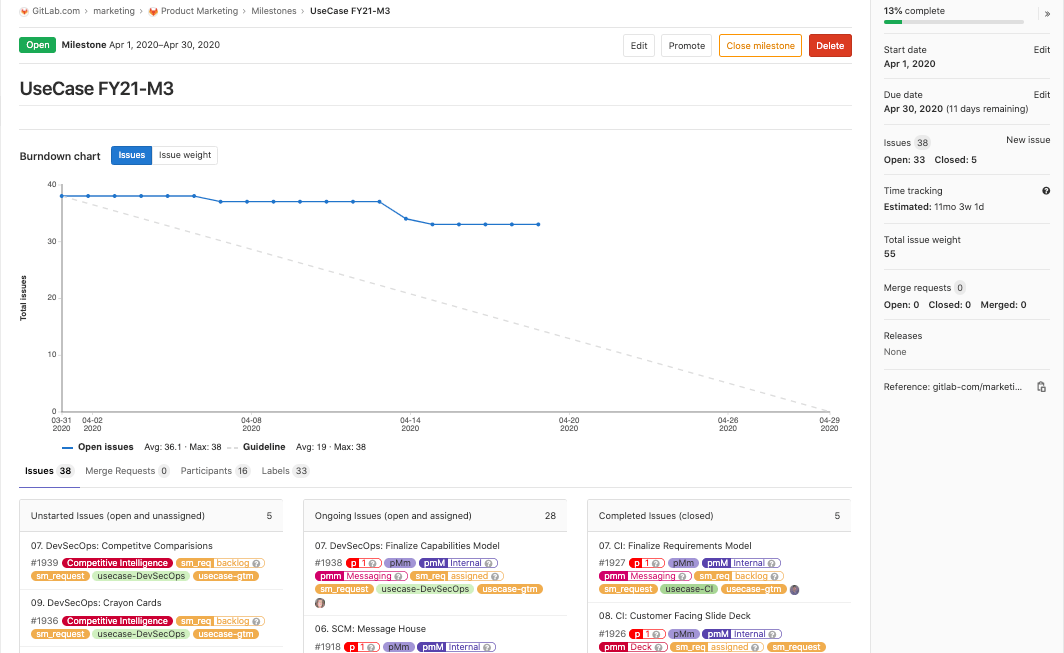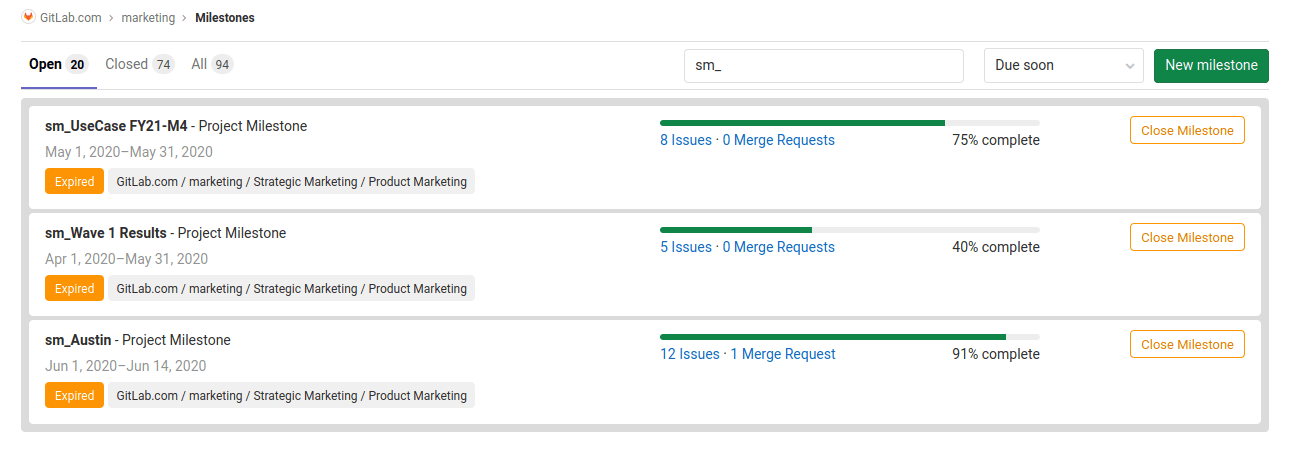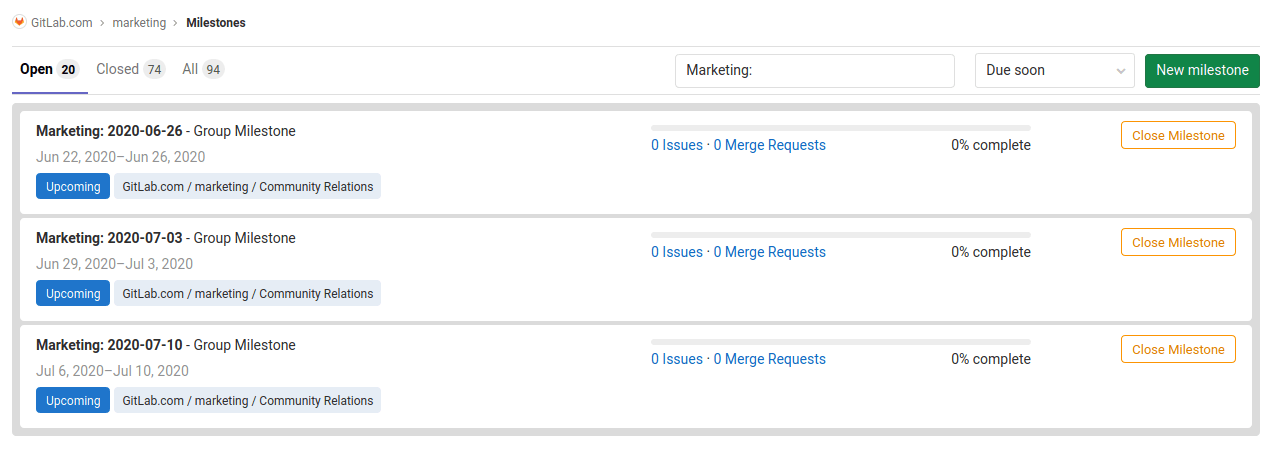Milestones project management guidelines
Background
There are two concepts of time-based tracking in GitLab.
- Milestones: useful for tracking the progress of multiple issues across a specific time period, and when planning and managing epics.
- Iterations: useful for planning agile or agile-like sprints to capture action items to be completed within a specific time period.
Milestones
Milestones are a great way to track the progress of multiple related issues across a specific time period. With milestones, you can see how fast issues are being completed in that time period (burndown chart), and you can view the issues grouped by labels, and grouped by status (unassigned, assigned, and completed)
Milestones are very useful when tracking the progress of multiple issues and when planning and managing epics.

Here are two examples of milestones:
- Product and Solution Marketing Quarterly Milestone - showing the bulk of strategic marketing work for a given quarter.
- UseCase Monthly Sprint Milestone
Key things to know
- Milestones can be created at both
ProjectandGrouplevels. - Milestones can be used to establish dates for epics (where the epic inherits the dates from the issues and associated milestones)
- Milestones set a date range (start date and end date)
- Issues are added to milestones
- Milestone lists can be sorted only by name and date (either
due dateorstart date)
Known limitations
- Milestone lists cannot be filtered and have limited sorting
- Milestones do not have labels and cannot be filtered by labels
- Milestones do not track history of changes or who created/changed the milestone
- On issues - when adding an issue to a milestone, the list of milestones is ALL of the milestones in that project and the parent groups (potentially LOTS AND LOTS of milestones)
- On groups - the list of milestones is ALL of the milestones defined in that group and below that group (potentially LOTS AND LOTS of milestones) - This feature request addresses this limitation.
- On Projects - the list of milestones is ONLY the milestones defined in that project (deceptively very few milestones.) see feature request
Guidelines
Define milestone at lowest level needed
Define milestones at the LOWEST level of the organization as possible.
- If the milestone ONLY applies to a specific project, then create the milestone there
- If the milestone applies to a group of projects, then create the milestone at the lowest possible group.
This will mean that the lists of milestones available to a given Issue (when adding an issue to a milestone) will be limited to a smaller list of relevant milestones. (though the list might still be very long)
Milestone Naming Convention - prefix in name
Because of the filtering limitations and the massive volume of potential milestones, a consistent Naming Convention is very, very, very helpful in finding the right milestones.
- All Milestone names should start with either the group or project abbreviation. The recommendation is to prepend the name with a two-letter abbreviation followed by underscore:
gg_.
For example:
- A project milestone in the “Revenue Marketing” project should be named:
**rm_**Milestone Name
- A group milestone in the “Product and Solution Marketing” group should be named:
**sm_**Milestone Name
This will help in two ways. First, when looking at lists of milestones, they can be sorted and put the related milestones together. Second, in issues, when adding a milestone, you can search by name, which will make it easy to find the right subset of milestones (either for the project or group)
Milestone Description - Include milestone history and who owns
Because the milestone does not yet include change history or details about who created it or why, we should use the description field to fill in the blanks.
- In the description field describe the purpose of the milestone and who is milestone owner/manager
Milestones Details
- Use for: larger units of work (in scope and duration) that resemble a release. E.g. an executive topic or campaign
- Implement with: milestones
- Time and duration: variable
- Naming convention:
teamprefix: MilestoneName - Issue management: via workflow and iteration issue boards
- Scope: default to lowest scope. Define at the top
marketinggroup for executive topics and integrated campaigns.

Recommended dates and duration: it depends, though shorter is often better. Because the milestone has dates for start and finish, the implication is that issues and MRs in the milestone are completed in this time window. If the milestone window is 3 weeks, then the expectation is that the work in the milestone is completed in that time frame.
Every team and every project is unique and there is no one answer for milestone duration. Some teams have had milestones as long as a quarter, others 4 weeks and others 1 week. Choose the duration that works for your team, learn, and evolve.
Iterations
Define iterations at highest level required
Define iterations at the HIGHEST level required of the organization as possible (for a cohesive approach using the same time-basis).
Iteration Naming Convention - Mktg in name
A consistent Naming Convention is helpful to ensure similar iterations (i.e. not including Mktg: are used by only the Marketing department at GitLab.
Iterations Details
- Use for: planning agile or agile-like sprints to capture tasks/user stories that can be completed within the iteration.
- Implement with: iterations
- Time and duration: 2 weeks, from Mondays to the following Sunday
- Naming convention:
Mktg: YYYY-MM-DD, with the ISO-formatted date being the end date of the milestone.Mktg:allows for filtering to only the Marketing-wide iterations, and the ISO date can help further filtering on month/day when assigning the milestone to an issue. - Issue management: via workflow and iteration issue boards
- Scope: defined at the top
marketinggroup, essentially for executive topics and integrated campaigns, but it is encouraged that all groups in Marketing use this one set of iterations for a unified workflow. These are the only iterations that will be defined at this level.

Backlog
- Use for: issues that are either not ready to be scheduled or not planned yet. Also as a bucket to choose and schedule issues for the next iteration(s) or milestone(s)
- Implement with: milestones at present.
- Time and duration: undefined. Start and due dates are not set.
- Naming convention:
Backlog - Issue management: see TBD: backlog refinement
- Scope: defined at the top
marketinggroup. When scheduling backlog issues on an issue board or on an issue list, the backlog can be further filtered by team.
c3b6922a)
